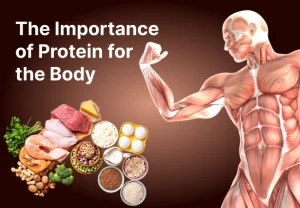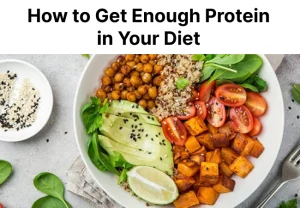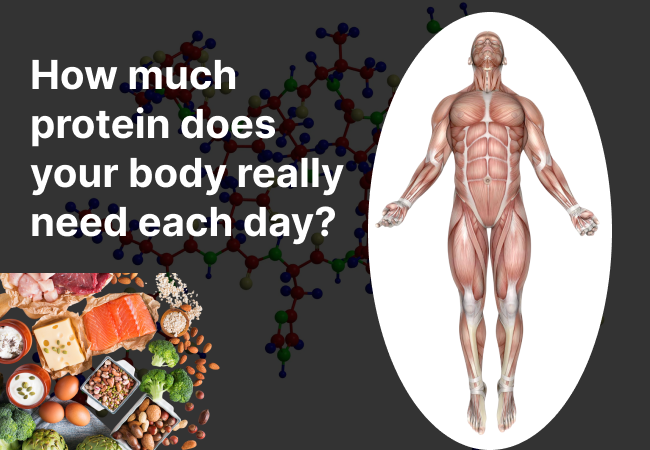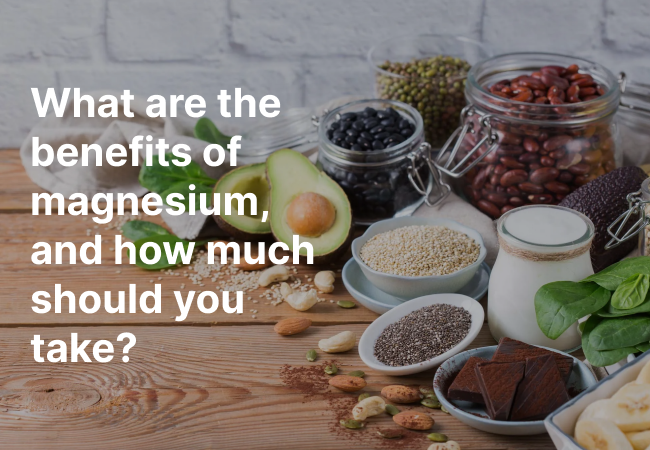How much protein does your body really need each day?
Protein: The Building Block of Life
Proteins are the essential building blocks that make up your body. They help you grow, repair, and stay strong. Every part of your body—muscles, tendons, organs, and skin—relies on protein.
But protein does more than build your body. It also helps create enzymes, hormones, and neurotransmitters—tiny molecules that keep your body and brain running smoothly. Without enough protein, your body can’t function at its best.
What Is Protein Made Of?
Proteins are made from small molecules called amino acids. Think of amino acids as beads on a string that come together to form different kinds of proteins.
Your body can make some amino acids, but others—known as essential amino acids—must come from your dietary protein. That’s why protein intake is so important for your nutrition and overall health.
Understanding Essential Amino Acids
There are 20 amino acids, and nine of them are essential. You can’t produce these nine on your own, so you must get them through protein-rich foods.
Both animal protein and plant-based protein sources can provide these amino acids. The key is eating a variety of foods to cover all your nutritional bases.
Different Protein Sources
Not all protein sources are equal. Some foods contain all nine essential amino acids, while others only have a few.
Here’s the breakdown:
- Animal protein sources like lean meats, fish, eggs, and dairy products usually provide all the essential amino acids. These are known as complete proteins.
- Plant-based proteins such as beans, lentils, nuts, and grains often lack one or more essential amino acids. But when you combine them smartly, they can still give you everything your body needs.
For instance, pairing rice and beans or hummus with whole-grain bread creates a complete amino acid profile.
The Importance of Protein for the Body

So, why is protein so important? Because it supports nearly every process inside you. Here are some key protein functions to know:
- Muscle Building and Repair – Protein rebuilds muscle tissue after workouts, helping you recover faster.
- Enzyme Production – Enzymes are proteins that drive chemical reactions like digestion and energy release.
- Hormone Regulation – Proteins create hormones that control metabolism and growth.
- Healthy Skin, Hair, and Nails – Protein strengthens tissues and supports glowing skin.
- Strong Immunity – Many antibodies that fight infections are made of protein.
Simply put, the importance of protein goes far beyond muscle—it’s about total body health.
How Much Protein Do I Need a Day?
When it comes to health and fitness, protein is one nutrient you can’t ignore. It keeps your muscles strong, supports recovery, and fuels your body for performance. But the question most people ask is — how much protein do I need per day?
The answer depends on your weight, lifestyle, and goals. Let’s break it down in simple terms.
Understanding the Recommended Dietary Allowance for Protein
The RDA for protein is 0.8 grams per kilogram of body weight, equivalent to 0.36 grams per pound.
This number represents the minimum daily protein intake your body needs to maintain basic health. It’s the amount required to keep you from becoming deficient — not necessarily the amount you need for strength, energy, or muscle growth.
If you’re active, training, or following a high-protein diet for abs, you’ll need more than the RDA to reach your goals.
What the RDA for Protein Really Means
The RDA for protein is a baseline, not a target for everyone. It covers your basic protein requirements, but most people benefit from eating a little more.
For example, athletes, gym-goers, and people trying to lose fat or build muscle may need 1.2 to 2.0 grams per kilogram of body weight. That extra protein supports muscle repair, helps manage appetite, and boosts metabolism — all key benefits if you’re on a high protein diet for abs or general fitness.
Daily Protein Intake for Adults

Most healthy adults meet their daily protein needs easily through a balanced diet. But knowing your numbers helps you stay on track.
- Sedentary adults: Approximately 0.8 grams of protein per kilogram of body weight
- Active adults: Between 1.2 and 1.7 grams per kilogram
- Athletes or strength trainers: Up to 2 grams per kilogram
Tracking your protein intake per day helps ensure you’re getting enough for recovery and muscle support.
Protein for Women
Let’s look at an example.
A 50-year-old woman who weighs 140 pounds and lives a sedentary lifestyle needs around 53 grams of protein per day.
But if she starts resistance training or follows a high-protein diet for abs, her needs will rise. Increasing protein intake helps build lean muscle, boosts metabolism, and supports fat loss — all crucial for core definition and overall health.
To calculate this easily, she can use a protein calculator to find her personalized daily protein requirement.
Protein During Pregnancy
Pregnancy changes everything, including your protein requirements.
During pregnancy, experts recommend consuming 75 to 100 grams of protein per day. This supports the development of fetal tissue, the placenta, and your growing blood supply.
A balanced protein diet during pregnancy promotes healthy development for both mother and baby. Always check with your doctor to confirm your specific protein recommendations.
How to Calculate Protein Intake Easily
If math isn’t your thing, here’s a simple formula to remember:
- Weigh yourself in pounds or kilograms.
- Multiply by 0.36 (pounds) or 0.8 (kilograms) for the minimum daily protein intake.
- For active individuals, go higher — 0.6–1 gram per pound is ideal for a high protein diet.
You can also use a protein calculator online to get a customized protein intake chart that adjusts based on your lifestyle and fitness goals.
For Daily Protein Intake, Think “Protein Package”
When it comes to daily protein intake, most people focus only on the amount. But what truly matters is the whole protein package. That means looking beyond the grams and understanding what comes along with your protein source—fats, carbs, vitamins, and minerals.
Why the “Protein Package” Matters
Research on the optimal amount of protein for good health is still ongoing. Scientists continue to explore how much protein you actually need for protein for good health, protein for weight loss, or protein for cardiovascular health.
One thing is clear—protein is essential, but not all protein sources are equal. A high-protein diet can help with muscle gain and even weight management, but the source and balance matter just as much as the amount.
More Protein Doesn’t Mean More Meat
Many people think “get more protein” means “eat more meat.” That’s not necessarily true. While animal protein, like beef, poultry, pork, milk, cheese, and eggs, provides high-quality protein, there are excellent plant protein options too.
Whole grains, beans, lentils, nuts, and even vegetables are rich protein sources that come with fiber, vitamins, and minerals. If you want a high-protein diet for abs, combining both animal and plant-based options ensures balance and variety.
Choose Healthier Protein Sources
When you pick your protein, focus on the protein package—what else comes with it?
Look for foods that are:
- Low in saturated fat
- Low in processed carbohydrates
- Rich in nutrients, vitamins, and minerals
Some great healthy protein sources include:
- Fish like salmon and tuna (good for heart health)
- Legumes such as beans, chickpeas, and lentils
- Nuts and seeds (great snacks full of healthy fats)
- Eggs and dairy for vegetarians
- Whole grains like quinoa and brown rice
These options not only support protein for metabolism but also improve protein for overall health and fitness performance.
Balance Is Everything
If you increase protein, you’ll likely need to reduce other nutrients to keep your total calories in check. This balance is key to good protein nutrition.
For example, replacing refined carbs like white bread and sweets with high-protein foods can improve your diet. But replacing them with high-fat meats can harm your heart. Always look for protein for heart health by choosing lean or plant-based options.
How to Get Enough Protein in Your Diet

Getting enough protein in your diet doesn’t have to be complicated. Whether you want to build muscle, lose weight, or simply stay healthy, focusing on high-protein foods can make a big difference.
Protein fuels your body. It supports muscles, boosts energy, and helps with cell repair. The best part? You can meet your daily protein intake easily with a few smart food choices.
The Best High-Protein Foods
You don’t need fancy supplements to meet your protein requirements. There’s a wide range of protein-rich foods available from both plant protein and animal protein sources.
Here are some of the best protein sources you can include in your meals:
- Tofu – A great plant-based option rich in protein and low in fat.
- Tempeh – Packed with fiber, vitamins, and a solid source of plant protein.
- Meat substitutes – Perfect for vegetarians who want to avoid animal meat but still enjoy protein for fitness.
- Lean meats – Chicken, turkey, and lean beef are excellent animal protein sources.
- Fish – Salmon, tuna, and mackerel not only offer protein for muscles but also healthy fats.
- Eggs – One of the most complete protein sources you can eat.
- Milk – Great for protein for energy, and bone health.
- Greek yogurt – Higher in protein and lower in sugar than regular yogurt.
- Quinoa – A supergrain that contains all essential amino acids.
- Legumes – Beans, lentils, and chickpeas are nutrient-dense and rich in plant protein.
- Nuts – Almonds, walnuts, and peanuts are great snacks loaded with protein and nutrition balance.
Each of these foods plays a role in maintaining your protein for overall health and meeting your daily protein intake per day goals.
Does Protein Have Any Negative Health Effects?
Some research links high-protein diets to kidney function concerns, but no direct cause-and-effect exists. For healthy adults, protein-negative health effects are minimal. Using a protein calculator can help track daily protein intake safely and ensure protein safety while supporting protein for health optimization.
People with kidney disease need special care. Those not on dialysis may need to limit protein intake, while individuals on dialysis often require more protein for health. Always consult a doctor before making major changes to protein consumption.
Protein benefits extend beyond muscle building. Adequate dietary protein supports protein and muscle strength, protein and bone strength, protein and immune support, protein and cellular function, and protein for energy. Following protein guidelines ensures your protein intake per day meets protein requirements.
A typical adult needs around 50 grams of protein for adults daily, but needs vary by age, sex, activity, and health goals. Those aiming for a high-protein diet for abs may need a higher intake to support muscle building and fitness.
Summary
Protein is essential for good health. It supports muscles, bones, immunity, and cellular function. A typical adult needs around 50 grams of protein per day, though requirements vary by age, sex, activity, and goals. Use a protein calculator to ensure safe intake and maximize protein benefits.
Popular Post
Recent Post
How much protein does your body really need each day?
Protein: The Building Block of Life Proteins are the essential building blocks that make up your body. They help you grow, repair, and stay strong. Every part of your body—muscles, tendons, organs, and skin—relies on protein. But protein does more than build your body. It also helps create enzymes, hormones, and neurotransmitters—tiny molecules that keep […]
Tongue Bumps: Common Causes and Effective Treatments
Ever notice small bumps on your tongue and wonder what caused them? Don’t worry — you’re not alone. Tongue bumps are common and often harmless. But sometimes, they can signal something more serious, like an infection, allergy, or injury that needs attention. Let’s break it down in simple terms. What Are Tongue Bumps? Your tongue […]
What are the benefits of magnesium, and how much should you take?
In the world of nutrients, vitamins, and supplements, magnesium is finally getting the attention it deserves. For years, it’s been the unsung hero of good health — overlooked, underappreciated, and often forgotten. But that’s changing. Today, more people are learning just how vital magnesium for health really is. From better sleep to stronger bones, the […]


